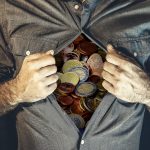WESTERN VALUES

C–span this morning seemed to be a litany of episodes of predatory behavior from hierarchical Establishment with the liability placed upon We The People. This seems to be “running government like a business” which on a continuum is organized crime.
While media highlights individual occurrences of poisoning of local communities, if media must cover said stories, FACTually We The People and nature are poisoned consistently by industrialization without regulation. Media may cherry-pick a story, the easier to pack it up and haul it off after the next disaster occurs. But poisoning of Americans can be said to happen across the board as industry chases profits. A portion of the profits seemed earmarked as big-money campaign contributions that buy politicians to pass laws at the behest of big business.
Be like Iceland — https://twitter.com/AmericanIndian8/status/1636774408122515490
Environmental disaster can also be a political-campaign strategy as phrases such as environmental racism rallies the troops to vote for politicians who then turn coat and promote big-business interests.
And so we have the “Western Values” NATO is insisting is the right of Ukraine, another nation that is infamously reported to be sufficiently corrupt to accept this system.
https://www.c-span.org/video/?526574-3/washington-journal-carsten-prasse-discusses-efforts-remove-forever-chemicals-drinking-water —
MARCH 18, 2023 | PART OF WASHINGTON JOURNAL 03/18/2023
Washington Journal
Carsten Prasse on Efforts to Remove “Forever Chemicals” From Drinking Water
Johns Hopkins University environmental health and engineering professor Carsten Prasse discussed efforts to remove “forever chemicals” from drinking water.
–end of c-span info–
Regulatory disregard for harm inflicted against nature and humanity does have a silver lining in its promotion of our for-profit health system that gains on disease rather than on good health.
https://mronline.org/2023/03/17/this-is-how-police-and-courts-steal-from-poor-people/?utm_source=rss&utm_medium=rss&utm_campaign=this-is-how-police-and-courts-steal-from-poor-people –Surprisingly, the judge asked Sonny,
How much money can you pay today?
–end of mronline info–
https://mronline.org/2023/03/17/yes-the-u-s-govt-did-bailout-the-banks-what-would-a-peoples-bailout-look-like/?utm_source=rss&utm_medium=rss&utm_campaign=yes-the-u-s-govt-did-bailout-the-banks-what-would-a-peoples-bailout-look-like –Many are outraged at the amount of money being thrown at banks and venture capitalists, and are calling for a bailout of the people, not the rich.
Why should it be a problem for depositors to want their money back, if banks exist to keep people’s deposits safe and whole? This is because in reality, banks do not keep money safe, they gamble with it. In order to generate profits, banks invest the vast majority of their customers’ deposits into stocks, bonds, or other securities.–end of rt info–
Mutual insurance companies are also largely a thing of the past, in which policyholders shared in the profits of insurance companies byway of dividends.
https://ilsr.org/rule/glass-steagall-act-the-volcker-rule/#:~:text=Under%20Glass%2DSteagall%2C%20commercial%20banks,in%20the%20trading%20of%20securities. —
Under Glass-Steagall, commercial banks (those that accept deposits) were prohibited from engaging in most investment banking activities, including underwriting and selling securities, and from affiliating with investment banks and other companies “engaged principally” in the trading of securities. Likewise, investment banks were barred from accepting deposits. The law gave banks one year to decide which path to take: get out of the securities business and receive the benefits of federal deposit insurance, or forgo accepting deposits and become investment banks.
Congress extended the Glass-Steagall Act in 1956 with the passage of the Bank Holding Company Act, which barred commercial banks and the companies that own them from engaging in non-banking activities, notably insurance. Lawmakers felt that banks should be walled off from the risks inherent in underwriting insurance.–end of ilsr info—
From MRonline—
https://us2.campaign-archive.com/?e=2833cdb99b&u=36ce609ae68971b4f060ad9c7&id=ec2fe40753 —
Insect Apocalypse in the Anthropocene, Part 2
Yes, the U.S. gov’t did bailout the banks. What would a people’s bailout look like?
This is how police and courts steal from poor people
–from mronline info–
From popularresistance — https://mailchi.mp/popularresistance/popular-resistance-daily-digest-kh2a3fxvwc?e=1b0a9c0541 —
The US Is The Greatest Threat To World Peace And Collective Humanity
Don’t Let The Media Cheerlead Us Into More Wars Like It Did in Iraq
US: Destroy Taiwan Semiconductor Factories If China Invades
The US And Canada Woo Latin America And The Caribbean To Invade Haiti
–end of popularresistance info–
https://www.aol.com/news/favre-must-remain-welfare-lawsuit-123007056.html –Millions of federal welfare dollars were intended to help low-income Mississippi residents — some of the poorest people in the country — but were instead squandered on projects supported by wealthy or well-connected people, including projects backed by Favre, prosecutors say.
–end of aol info–https://www.rt.com/business/573173-london-metal-exchange-fraud/ –The exchange did not name the warehouse or its location, but several media outlets later reported, citing sources, that the supposed nickel bags were actually filled with stone. The fake nickel was reportedly stored at an LME warehouse in Rotterdam operated by Access World, which declined to comment on the news.
–end of rt info–
From bloomberg———
https://www.rt.com/business/572347-norilsk-nickel-china-yuan-trade/ —
Currently, the vast majority of commodity trade in the world is based on global benchmark prices in US dollars. But the trend may change as Russia and China are looking for ways to increase trade in local currencies and cut dependence on dollars.
Last March, the LME, the world’s oldest and largest exchange for industrial metals, canceled all nickel trades for eight days after prices surged by more than 50% in a matter of hours to above $100,000 a ton. The suspension left consumers and producers without key benchmark prices and damaged the exchange’s reputation.
–end of bloomberg info—